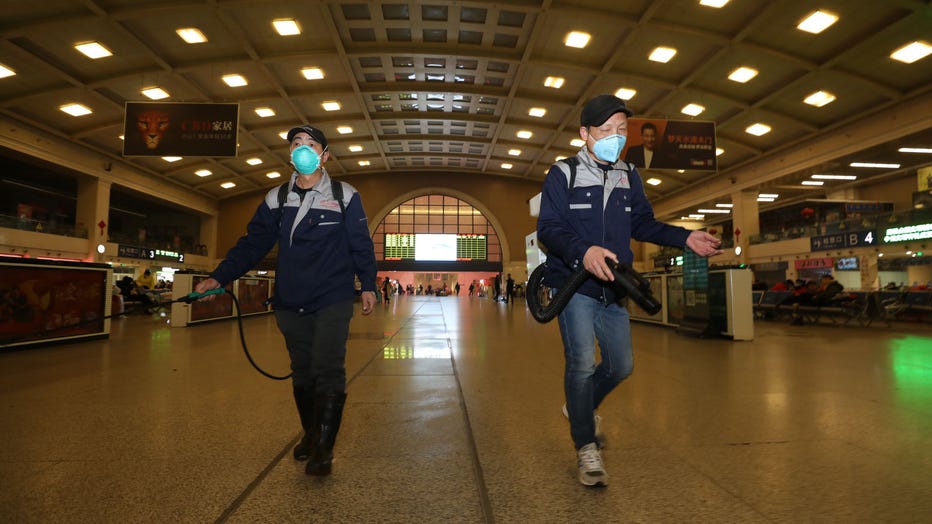Death toll in China’s coronavirus outbreak rises to 17, prompting fears of wider spread

Cases of deadly new coronavirus rise sharply in China
A Chinese health official says 440 cases of the new coronavirus have been confirmed and at least nine deaths.
BEIJING - Health officials in China urged residents in the city of Wuhan to avoid crowds and public gatherings following news that a new viral illness has infected more than 400 people and killed at least 17.
Authorities warned the deadly coronavirus could spread further as the number of new cases has risen sharply in China, the center of the outbreak, and as far as Washington state in the United States.
Seventeen people have died, all in Hubei province, since the outbreak emerged in its provincial capital of Wuhan late last month, officials announced Wednesday night. They said the province has confirmed 444 cases there.
“There has already been human-to-human transmission and infection of medical workers," Li Bin, deputy director of China's National Health Commission, said at a news conference with health experts. “Evidence has shown that the disease has been transmitted through the respiratory tract and there is the possibility of viral mutation.”
RELATED: Human-to-human transmission confirmed in China coronavirus outbreak
Video shared Jan. 21 shows commuters in Wuhan wearing face masks on a local subway. Pharmacies in the city limited sales of face masks to one package per customer as people lined up to buy them.
“Almost everyone is now wearing masks … I guess taking the necessary precautions to avoid getting infected,” Monasbu, who lives in Wuhan, told Storyful.
Medical workers in protective suits could be seen carrying supplies and stretchers into Wuhan Medical Treatment Center, where some of the patients are being treated.

Workers disinfect a railway station in Wuhan in central China's Hubei province on Jan. 22, 2020. (Photo credit: Feature China / Barcroft Media via Getty Images)
The World Health Organization convened Wednesday in Geneva to determine whether the outbreak should be declared a global health crisis.
The illness comes from a newly identified type of coronavirus, a family of viruses that can cause the common cold as well as more serious illnesses such as the SARS outbreak that spread from China to more than a dozen countries in 2002-2003 and killed about 800 people.
RELATED: Coronavirus: What to know about the mysterious illness
Authorities in Thailand on Wednesday confirmed four cases, a Thai national and three Chinese visitors. Japan, South Korea, the United States and Taiwan have all reported one case each. All of the illnesses were of people from Wuhan or who recently traveled there.
“The situation is under control here," Thai Public Health Minister Anutin Charnvirakul told reporters, saying there are no reports of the infection spreading to others. “We checked all of them: taxi drivers, people who wheeled the wheelchairs for the patients, doctors and nurses who worked around them.”
Macao, a former Portuguese colony that is a semi-autonomous Chinese city, reported one case Wednesday.
U.S. President Donald Trump said: “We do have a plan, and we think it’s going to be handled very well. We’ve already handled it very well. ... we’re in very good shape, and I think China’s in very good shape also.”
RELATED: US to screen airline passengers from China for new illness
Travel agencies that organize trips to North Korea said the country has banned foreign tourists because of the outbreak. Most tourists to North Korea are either Chinese or travel to the country through neighboring China.
Other countries have stepped up screening measures for travelers from China, especially those arriving from Wuhan. Worries have been heightened by the Lunar New Year holiday rush, when millions of Chinese travel at home and abroad.
Officials said it was too early to compare the new virus with SARS or MERS, or Middle East respiratory syndrome, in terms of how lethal it might be. They attributed the spike in new cases to improvements in detection and monitoring.
“We are still in the process of learning more about this disease,” Gao Fu, an academician of the Chinese Academy of Sciences and head of the Chinese Center for Disease Control, said at the news conference.
Gao said officials are working on the assumption that the outbreak resulted from human exposure to wild animals being sold illegally at a food market in Wuhan and that the virus is mutating. Mutations can make it spread faster or make people sicker.
Jiao Yahui, a health commission official, said the disease "will continue to develop. It has developed different features compared with the early stage, and the prevention and precautionary measures need to change accordingly.”
One veteran of the SARS outbreak said that while there are some similarities in the new virus — namely its origins in China and the link to animals — the current outbreak appears much milder.
Dr. David Heymann, who headed WHO’s global response to SARS in 2003, said the new virus appears dangerous for older people with other health conditions, but doesn’t seem nearly as infectious as SARS.
“It looks like it doesn’t transmit through the air very easily and probably transmits through close contact,” he said. “That was not the case with SARS.”
Health officials confirmed earlier this week that the disease can be spread between humans after finding two infected people in Guangdong province in southern China who had not been to Wuhan.
Fifteen medical workers also tested positive for the virus, the Wuhan Municipal Health Commission has said. Fourteen of them — one doctor and 13 nurses — were infected by a patient who had been hospitalized for neurosurgery but also had the coronavirus.
The Associated Press contributed to this report. It was reported from Cincinnati.

